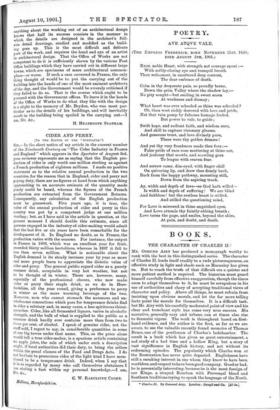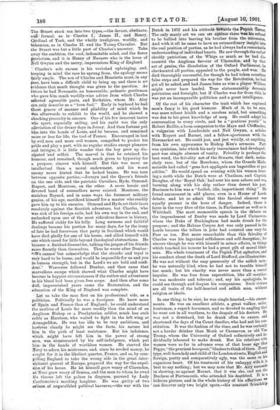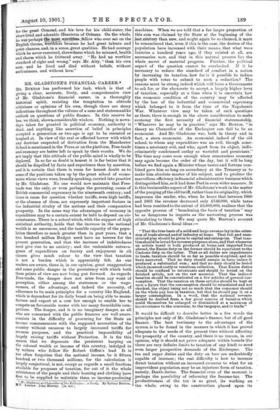BOOKS.
THE CHARACTER OF CHARLES U$ MR. OSMUND AIRY has produced a monograph worthy to rank with the best in this distinguished series. The character of Charles II. lends itself readily to a rude picturesqueness, an effective study in light and shade such as Macaulay has given us. But to reach the truth of that difficult era a quieter and more patient method is required. The historian must guard himself carefully from effective exaggeration, though the times seem to adapt themselves to it, he must be scrupulous in his use of authorities and chary of accepting traditional views of character and policy. Above all things, he must refrain from
insisting upon obvious morals, and let the far more tellinatask-,facts point the morals for themselves. It is a difficult task-,
but Mr. Airy with his carefully moderated point of view and his clear and trenchant style has come very near success. His narrative, generally easy and urbane, can at times also rise to dramatic vigour. The work is throughout based on first- hand evidence, and the author is the first, as far as we are aware, to use the valuable recently found memoirs of Thomas Bruce, one of the gentlemen of Charles's bedchamber. The result is a book which has given us great entertainment, a sad study of a bad time and a hollow King, but a story of vast significance in English history, and not without its redeeming episodes. The popularity which Charles won at the Restoration has never quite departed. Englishmen have still a sneaking interest in one whom they know to have been worthless, and suspect to have been good company. Good or bad, he is perennially interesting, because he is the most foreign of our Kings, a strayed Bourbon with Provencal blood and Southern traditions trying to speak the language of the North.
• Chart.; II. By Chnnund Airy. London : Gonpil and Co. [OA.] The Stuart stock ran into two types,the devout, obstinate, aria: formal, . as in - Charles I., 'James It, and Henry, Ciirdinal. of York, and the wholly irreligious, worldly, and bOhemian, as in Charles IL' and the :Young Chevalier. But the Stuart was but a little part of Charles's ancestry. Take away the ambition, the cool, -indomitable mind, and the fierce t triotism, and it is . Henry of Navarre who is the lover of Nell Gwynn and the merry, impecunious:King of England. . _ Charles's sole excuse is hie wretched upbringing, ' and, keeping in mind the race he sprung from, the apology seems ' ly ample. , The son of Charles 'and Henrietta must, in any ase, have been a difficult child -to' bring up, and them is no sitidence that much thought, was given to the question., As tutors he had Newcastle, an honourable; pedantic gentleman who gave him, much worldly-wise advice from which Charles :selected agreeable parts, and Berkshire, ' whom Mr. Airy can only describe as a " born fool." Early in boyhood he. had tho;e graces of manner and pliability of ' mind which he *as - afterwards to exhibit to the world, and he showed a shocking precocity in anioura. One of his few innocent tastes Was sport, especially sailing, and his yacht was the only alleviation•of the dieary days in Jersey. And then fortime put him into the hands of Louis,•and he became, and remained more or less for life, the tool of France. Encouraged in lust by, evil, men and more - evil women, compelled to pocket his pride and play a part, with no regular studies except pleasure and intrigue, it is little wonder that the boy grew up dis- sipated 'and selfish. The marvel is. that he retained his humour, and remained, though much given to hypocrisy for a purpose, sincere with himself. But this was more an intellectual 'thin • a moral • endowment, and his worst enemy never hinted that he lackedbrains. He was torn between opposite parties,—Jerniyri'and the Queen's friends on the one side; and the patriotic Cavaliers, Hyde, Ormond, Rupert, and Montrose,. on the 'other. A more heroic and devoted band of counsellors never , existed. . Montrose, the stainless Bayard, and in some ways the foremost military genius, of his age, sacrificed himself for a master whb readily • gave him up to his enemies. ' Ormond and Hyde set their faces resolutely against the SbOttish adventure, but Charles, Who was sick of his foreign exile, had his own way in the end, and embarked upon one of the most ridiculous fiascos in history. He Suffered richly for his folly. Long sermons and faithful dealings became his portion for many days, for by the irony of fate he had foresworn that party in Scotland which would have died gladly for one of his house, and allied himself-With onewhich cared for little beyond theological abstractions. He became a finished dissembler,, talking the jargon-of his friends. More fluently than themselves. Thus he wrote after Dunbar : "Me. Cainitt`.but acknoviledge that' the stroake ' and tryal' is ve6e.hard' to be borne, and would be impoisible for_ us and you iiiltrinan strength; but :in the Lord's we are bold and confi- (IMO • Worcester followed Dunbar, and - then came that Marvellous escape • which' showed' what. Charles might have becorrie 'in happier circumstances if the outlaw and adventurer in ‘hie blood had been given free scope. And then after some dull, impoverished years came the Restoration, and the edimation of the King of England was complete.
Let - us take the man first on his professional side, as a politician. Politically he was ,a foreigner. He kneW more of -Spain' and France than of England; he could understand the' motives of Louis far more readily than the. mind of an Anglican Bishop or a Presbyterian soldier, much less such re116' as 'Harrison; who waited to fight in the left wing .at Armageddon.. He was too idle. to be very ambitious,- and hotieter,* clearly he might . see the facts, his nature. led him 'in the path of least resistance. But his, indolence, Which might have left him in the power, of . strong Men, was counteracted' by his self-indulgence, which , put him • in • the hands of worthless women. • He starved the *ay); to adorn his. istresses, and, since he needed money, he soaglit ' for it hi the likeliest quarter,.Prarice, and so, by corn-, .PSIling England to take ' the . wrong side in -the. great .inter7 dational ,quarrel of Europe, prepared the way 'for the expul- Slon of 'his house. He let himself grow weary of; Clarendon, a,:eNero grew weary of Seneca, and the man _to WhOm.he-owed his, throne left the_ palace..in disgrace, :pursued. by.. Lady - CzistleMaitie's mocking 'laughter. He was ..guilty. of - two *rimes, of unparalleled political haseness,--the war with the can 'discover only two bright spots;—his constant Irienaohl Dutch in 1672 and his -attitude tOttards the Popish Terror. The only manly act we can' set against thimArsie his ref -nu! to be 'bullied • into came his brother' frbm the Alfiecession. And with 'Wail 'he came to have an extraordinary insight into the real position of parties, as he had always hada remarkable understanding of individual hearts. He saw through.the rather shoddy- patriotism' of the' 'Whigs as• much as; he had dis. Counted the 'Anglican fervour of Clatentlon,' Oa. by -that act. of . genius, the dissolution- of the Oiford Parliamenthe checkmated all parties, appealed to the people, and won. • He died thoroughly successful, for though he had taken countless false steps and prepared the way for the 'Revolution, -he had got' all he asked, and had 'James k+n as Wine a player William might never have landed. True statesmanship" demands patriotism and foresight, but if Charles was fat 'from this; he was yet an incomparable politician and a great intelligence.
Of the rest of his good the trait which has captured men's _fancy is his, good humour. Much of it, to be sure, was mere robust health and a careless mind, but something was due to his great knowledge' of mev. • He could adapt his conversation to every circle,: and be a " gmOioui yotith "' to Robert Baillie, a boon companion to the Mays and Chiffinehes, a • vulgarian with Lauderdale and Nell Givynn, a Bekaa:. with Rupert and Burnet, 'and a felloW-sPortsman with •the Newmarket set. He could jest, and jest wittily, at anything, from his ' own apPeararice to Bishop Ken's sermons. Part was cynicism, into which his early insouciance had developed; part was simple absence of-vanity. Pritolity is perhaps the best: word, the frivolity not of the Stuarts; that dark, melan- choly race,- but of the Bourbthis,• whom the Grande:Made. moidelle had called " gens fort apPliqués aux bagatelles et pen stades." He would spend an evening. with:hid *omen hant- ingri moth while the Dutch were. at Chatham, and Captain Douglas, of the ' Royal Oak,' had sent his men ashore and was burning along with his ship rather than deiert his post, Business to him was a "foolish, idle, impertinent thing." He found amusement in odd places, even in a HotiSe` of Lords debate, and let us admit that • this farcical element was equally present in the hour of danger. Indeed, 'there is farce in the very fibre of the times, in Parliament as well as in WhitehalL The most .memorable speech ,in the• debate on the impeachment of Danby was made by Lord darnarvon, Whom the Duke of Buckingham had made drunk for the purpose and the Habeas Corpus Act was only passed in the Lords because the tellers in joke had counted' one very fat Peer as ten. 'But • more remarkable than. this frivolity of Charles was his ingrained selfishness and self-decePtion-;•for sincere though he was with himself in minor affairs, in things which touched his honour he had a great gift of moral blind- nees. . His .wh'ole treatment of the Popish Plot agitation; and his conduct about the death of Lord StaffOrd; tire Whitt:allots. He was not without the easy generosity of the selfishimdn; he' was- naturally kind, when he had not to trouble himself too much ;. but his charity. •was. never more than a' casual impulse., He was free :from superatition,' like all sceptics; he was moderate and tolerant ; and, say his • aPologists, he could see through and-despise his companions: Stich-virtues are all. traits of the half-hearted and • selfish min, • without religion or ideals.
• In one thing, to be sure, he was single-heart ed,-7-his amuse- ments. He was an excellent athlete, a great walker, sailor, huntsman, a superb horseman, and so devoted to angling that he went out in all -weathere,.to the despair of his doctOrs. He was not a -drunkard, but he drank often to excess, and shortened the days of the.. Court dandies, who had not his con- stitution. ' It was the fashion of thetime, and he was certaini9 not a harder drinker than Monk or Carnarvon or Old, Van Tromp, whom the University of: Oxford collectively and•in- dividually laboured 'to make drunk. But his relations kith women 'were so far in advance .even of .that loose' ago' that Pepys;" the prurient bOurgeeie bluslieS to think of them. :2very type, well-born lady and child of the London streets; English and foreign, pretty and .comparatively ugly, was the same ,to zapacioua heart. Of his treatment of , his unhappy Wife it is . best to say nothing ; but we may note that Mr. Airy succeeds in showing; as against Burnet, that it was she Una not-the Duchess of Portsmouth, who-attended. his-deathbed. It,is a bideoispiethre, and in the whole history-of his affections we for the great Ormond, and- his-love for his-child-sister; the short:lived and adorable nenrietta of Orleans. On the whole, he was 'perhaps the most: worthless...felloW who ever sat'on the gag,ruili throne, wort less because he had great talents and great chances, and, in a sense, great qualifies. He had courage which he never exercised, shrewdness which he misused, health and charm which he frittered away.' "He had no worthier standard of right and wrong," says Mr. Airy, " than his own ease, and he lived and died without beliefs; without enthusiasms, and without love."




































 Previous page
Previous page